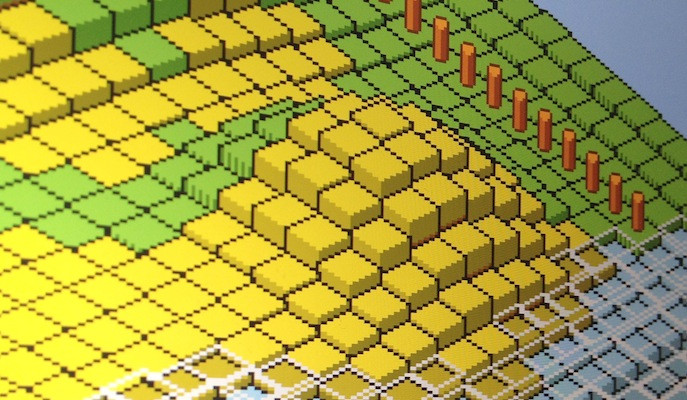The island: a primitive multiplayer game processing workshop
Andreas Gysin, www.ertdfgcvb.ch
24 – 28 June 2013

Overview
The Island is a workshop aiming at exploring the design opportunities offered by Processing software for creating generative graphics, animation algorithms and collaborative digital environments. The Island is a multiplayer game and a framework for learning the basics of designing through creative coding.
Goals
In this Processing workshop participants will create an island and populate it with programmed characters. Each character will be designed and controlled by its own creator and it has to survive on the island. The process and techniques for designing the character will be based on a set of common rules defined during the workshop.
Beginners will go trough the basics of the Processing drawing API while participants with advanced knowledge will start designing and implementing the project engine and the characters’ behaviours.
Final goal is to create a multiplayer game where all participants will collaborate in the battle for survival on the Island with his/her programmed character. The workshop topics are:
- the structure of a Processing sketch;
- the Processing graphics API;
- procedural animation;
- network;
- object oriented programming;
- polymorphism and reflection.
Requirements
The workshop is addressed to people with different level of knowledge of Processing (beginner, intermediate, advanced). Each participant should bring his own laptop with the latest version of Processing pre-installed, sunglasses and a bath suit.
Supported by
http://www.swissdesignnetwork.org
Gallery
Visit the flickr album.
Maker crash course - 3D modeling and printing for beginners
Costantino Bongiorno, www.wemake.cc
20 – 21 May 2013

Overview
Digital fabrication is the use of computer-controlled tools instructed by data files generating fabrication operations. This rapidly evolving field is doing to manufacturing what the Internet has done to information-based goods and services: it’s lowering entry level costs for small scale production, and thanks to the impact of Open Source technologies and design, it is making design and production know-how accessible to non expert people.
Goals
Goal of the workshop is to provide participants without any technical background with the skills to make physical artifacts through Open Source techniques of 3D modeling and printing.
Through a hands-on approach, participants will learn:
- the basics of 3D modeling and printing using Open Source programs to design and print a simple objects;
- the functioning of computer controlled machines such as a 3D printer and a laser cutter;
- to process the 3D file to use other digital fabrication tools slicing the object in components that will be produced starting from a sheet of material;
- to use other simple (manual) techniques to get the job done.
Requirements
The workshops are open to students, professionals and amateurs with different background. No specific knowledge or competence is required (beginner level).
Creating moving objects with rhinoceros and laser cutting techniques
Enrico Bassi, www.fablabtorino.org
22 – 24 May 2013

Overview
One of the most common and versatile digital technologies is the laser cut, a type of computer-controlled machines that allows to make 3D objects prototypes through 2D design techniques. A laser cutter, like every other technology, it has its own language and rules that can be applied to create artifacts such as moving objects, objects featuring dynamic mechanisms and behaviors.
Goals
Through the editing and personalization of a kinetic artifact, such as the Theo Jansen (see Animaris Rhinoceros http://bit.ly/IfRmt), the workshop points at exploring the most useful design solution, potentialities and tricks of laser cut.
Thanks to a hands-on approach, participants will learn:
- how to develop a 3D model into a 2D file for the lasercut
- how to prepare, develop and export a file for the lasercut in Rhino 4
- the most common ways to make junctions and connections
- the most common ways to make hinges and dynamic parts
- learn how to work with plywood, paper and plexiglass
- develop his ows design library of sketches and technical solutions
During the workshop, participants will use the laser cut of FabLab SUPSI Lugano and confront it with the work of a 3D printer.
Requirements
The workshops are open to students, professionals and amateurs who want to learn more about digital fabrication techniques, fast prototyping and the design of moving objects. Basic and intermediate knowledge of 3D and 2D modeling and the Rhinoceros software environments is required to attend the workshop.
Wearable computing with arduino
Massimo Banzi and Zoe Romano, www.arduino.cc / www.openwear.org
3 – 7 June 2013

Overview
Wearable computing refers to the study or practice of inventing, designing, building, or using miniature body-borne computational and sensory devices. While the technological development supports the diffusion of wearable computing solutions within the end-user market, practices of Open design, Open hardware and digital fabrication are stimulating the configuration of novel scenarios for the design of interactive wearables where collaboration and openness play the pivotal role.
Goals
Goal of the workshop is the design and prototyping, through the Arduino platform, of objects that sense, interpret and react to the real world and that can be wearable and digitally fabricated.
The workshop will provide participants with useful insights and information about the state of the art in wearable computing.
During the first phase of the workshop, notions of physical and wearable computing will be provided together with an introduction to the Arduino platform. In the second phase, workshop activities will point at exploring the world of physical computing and digital fabrication applied to wearable computing and open source fashion, in particular, to the implementation of digitally fabricated accessories and wearables featured by interactive behaviors.
Requirements
The workshop requires some rudimentary understanding of programming. Applicants without previous experience are warmly welcome to contact us for getting a list of books for reference.
Gallery
Visit the flickr album.
